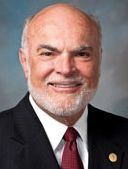The sponsor of Texas’ ill-fated texting & driving bill isn’t going away quietly. And he’s making the issue personal.
State Rep. Tom Craddick charges that his measure “succumbed to the will of a stubborn chairman,” state Sen. Robert Nichols of the Transportation Committee.
 Craddick (pictured, left) said the former Texas Department of Transportation commissioner “thought that he knew better for Texas when he refused to allow a vote on this bill that would save lives.”
Craddick (pictured, left) said the former Texas Department of Transportation commissioner “thought that he knew better for Texas when he refused to allow a vote on this bill that would save lives.”
Craddick made his anger public after his HB 63 cleared the House by a wide margin (97-45), received an emotional hearing before the Senate panel, but suddenly was shut down by the chairman — who cited resistance in the Senate and a likely veto from Gov. Rick Perry. The governor rejected Craddick’s similar texting plan in the previous session following its approval by the House and Senate.
Craddick said he and his allies in the Senate had enough votes on the committee and on the floor to send the bill to the governor.
Chairman Nichols told a newspaper last week: “It’s a lot of pain to put the members through for a likely veto. If it is not going to pass in the governor’s mansion, why do we need to go through this?”
Early in the year, Craddick called his plan “the big bipartisan bill of the session.”
“House and Senate members, Democrats and Republicans, from across the state lined up to co-author this important public safety bill,” he wrote. Both Craddick and Nichols are Republicans.
 Nichols (pictured, right) also could have allowed a vote on the similar Senate Bill 28, but did not.
Nichols (pictured, right) also could have allowed a vote on the similar Senate Bill 28, but did not.
“For those Texans wondering why 40 other states have a ban but Texas still allows drivers to text while driving and put the lives of others in danger, we have Sen. Robert Nichols to thank for that,” Craddick wrote in a May 28 opinion column in the Midland Reporter-Telegram. (Craddick, who represents House District 82, is from Midland.)
The Texas Legislature does not meet again until 2015. Craddick vowed to continue his fight in that session, assuming he is re-elected.
Texas and Florida were considered key states in the 2013 legislation season’s debate over distracted driving laws. They were the largest remaining states without text messaging and driving bans until Florida enacted a texting law this week via its governor’s signature.
Texas distracted driving laws: Drivers under the age of 18 prohibited from using wireless communications devices. Novice drivers with restricted licenses and school bus drivers are not allowed to use cell phones.


Before trying to pass phony, feel good laws, Rep. Craddick should have done some research. According to the Insurance Institute for Highway Safety (IIHS), anti-texting laws have no effect on safety. Quite the contrary they encourage dangerous driving. How so, you might ask? Well, you see boys and girls when States pass anti-texting laws that doesn’t stop drivers from texting. It merely forces them to hide the device in their lap, which necessitates them to take their eyes completely off the road while texting. IIHS documents an increase in crashes and fatalities in States that pass such laws.